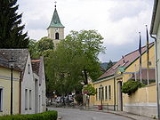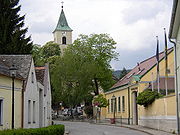
Bad Fischau-Brunn
Encyclopedia
The market town
of Bad Fischau-Brunn is an Austria
n municipality
in the district
of Wiener Neustadt-Land
in Lower Austria
. It is situated some 50 km south of Vienna
at the edge of Viennese Basin.
Bad Fischau-Brunn is divided into two Katastralgemeinde
n:
The place has been inhabited since the 5th millennium BC and was the site of an important Celtic settlement. Later, there were Romans, Germanic peoples
, Avars
und Slavs
until Charlemagne
established two marches in the 8th century.
In the 12th century Fischau became a market town and was site of the mint
, too. However, it lost its importance after the newly founded Wiener Neustadt
became a ducal residence.
The prefix "Bad" (spa town) has been added to the name in 1929.
 From 1871 to 1873, a thermal spring (18 °C, for people with rheumatism
From 1871 to 1873, a thermal spring (18 °C, for people with rheumatism
- and cures) was established as a spa in the architectural style of the time. It became the important part of tourism. The spa has been preserved in its style to this day.
Bad Fischau-Brunn also has a church and a fort (built in the 12th century, renewed in 1728 and 1830 and renovated in 2003) as well as the stone cave Eisensteinhöhle and the cave museum.
, tourism
, catering
, businesses (especially small businesses).
Market town
Market town or market right is a legal term, originating in the medieval period, for a European settlement that has the right to host markets, distinguishing it from a village and city...
of Bad Fischau-Brunn is an Austria
Austria
Austria , officially the Republic of Austria , is a landlocked country of roughly 8.4 million people in Central Europe. It is bordered by the Czech Republic and Germany to the north, Slovakia and Hungary to the east, Slovenia and Italy to the south, and Switzerland and Liechtenstein to the...
n municipality
Municipality
A municipality is essentially an urban administrative division having corporate status and usually powers of self-government. It can also be used to mean the governing body of a municipality. A municipality is a general-purpose administrative subdivision, as opposed to a special-purpose district...
in the district
District
Districts are a type of administrative division, in some countries managed by a local government. They vary greatly in size, spanning entire regions or counties, several municipalities, or subdivisions of municipalities.-Austria:...
of Wiener Neustadt-Land
Wiener Neustadt-Land
Bezirk Wiener Neustadt-Land is a district of the state of Lower Austria in Austria.-Municipalities:Suburbs, hamlets and other subdivisions of a municipality are indicated in small characters.* Bad Erlach**Brunn bei Pitten, Erlach, Linsberg...
in Lower Austria
Lower Austria
Lower Austria is the northeasternmost state of the nine states in Austria. The capital of Lower Austria since 1986 is Sankt Pölten, the most recently designated capital town in Austria. The capital of Lower Austria had formerly been Vienna, even though Vienna is not officially part of Lower Austria...
. It is situated some 50 km south of Vienna
Vienna
Vienna is the capital and largest city of the Republic of Austria and one of the nine states of Austria. Vienna is Austria's primary city, with a population of about 1.723 million , and is by far the largest city in Austria, as well as its cultural, economic, and political centre...
at the edge of Viennese Basin.
Bad Fischau-Brunn is divided into two Katastralgemeinde
Katastralgemeinde
A Katastralgemeinde , a German word , is a cadastral subdivision of municipalities in the nations of Austria, Croatia, the Czech Republic, Slovakia, the Italian provinces of South Tyrol, Trentino, Gorizia, Trieste, and in Slovenia.A cadastral community records property ownership in a cadastre,...
n:
- Bad Fischau
- Brunn an der Schneebergbahn.
History
The town of Fischau was mentioned in written records for the first time in 1130. The current market town was formed in 1969 by merging the municipalities of Brunn an der Schneebergbahn and Bad-Fischau.The place has been inhabited since the 5th millennium BC and was the site of an important Celtic settlement. Later, there were Romans, Germanic peoples
Germanic peoples
The Germanic peoples are an Indo-European ethno-linguistic group of Northern European origin, identified by their use of the Indo-European Germanic languages which diversified out of Proto-Germanic during the Pre-Roman Iron Age.Originating about 1800 BCE from the Corded Ware Culture on the North...
, Avars
Eurasian Avars
The Eurasian Avars or Ancient Avars were a highly organized nomadic confederacy of mixed origins. They were ruled by a khagan, who was surrounded by a tight-knit entourage of nomad warriors, an organization characteristic of Turko-Mongol groups...
und Slavs
Slavic peoples
The Slavic people are an Indo-European panethnicity living in Eastern Europe, Southeast Europe, North Asia and Central Asia. The term Slavic represents a broad ethno-linguistic group of people, who speak languages belonging to the Slavic language family and share, to varying degrees, certain...
until Charlemagne
Charlemagne
Charlemagne was King of the Franks from 768 and Emperor of the Romans from 800 to his death in 814. He expanded the Frankish kingdom into an empire that incorporated much of Western and Central Europe. During his reign, he conquered Italy and was crowned by Pope Leo III on 25 December 800...
established two marches in the 8th century.
In the 12th century Fischau became a market town and was site of the mint
Mint (coin)
A mint is an industrial facility which manufactures coins for currency.The history of mints correlates closely with the history of coins. One difference is that the history of the mint is usually closely tied to the political situation of an era...
, too. However, it lost its importance after the newly founded Wiener Neustadt
Wiener Neustadt
-Main sights:* The Late-Romanesque Dom, consecrated in 1279 and cathedral from 1469 to 1785. The choir and transept, in Gothic style, are from the 14th century. In the late 15th century 12 statues of the Apostles were added in the apse, while the bust of Cardinal Melchior Klesl is attributed to...
became a ducal residence.
The prefix "Bad" (spa town) has been added to the name in 1929.
Culture and sites of interest

Rheumatism
Rheumatism or rheumatic disorder is a non-specific term for medical problems affecting the joints and connective tissue. The study of, and therapeutic interventions in, such disorders is called rheumatology.-Terminology:...
- and cures) was established as a spa in the architectural style of the time. It became the important part of tourism. The spa has been preserved in its style to this day.
Bad Fischau-Brunn also has a church and a fort (built in the 12th century, renewed in 1728 and 1830 and renovated in 2003) as well as the stone cave Eisensteinhöhle and the cave museum.
Economics and infrastructure
The main economics and infrastructure in the municipality are agricultureAgriculture
Agriculture is the cultivation of animals, plants, fungi and other life forms for food, fiber, and other products used to sustain life. Agriculture was the key implement in the rise of sedentary human civilization, whereby farming of domesticated species created food surpluses that nurtured the...
, tourism
Tourism
Tourism is travel for recreational, leisure or business purposes. The World Tourism Organization defines tourists as people "traveling to and staying in places outside their usual environment for not more than one consecutive year for leisure, business and other purposes".Tourism has become a...
, catering
Catering
Catering is the business of providing foodservice at a remote site or a site such as a hotel, public house , or other location.-Mobile catering:A mobile caterer serves food directly from a vehicle or cart that is designed for the purpose...
, businesses (especially small businesses).

